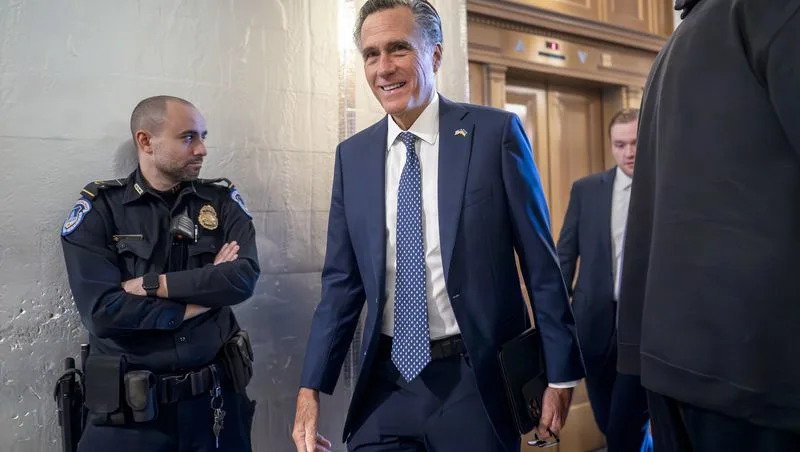WFLA
Senate passes $95.3 billion aid package for Ukraine, Israel and Taiwan after rare all-night session
Mary Clare Jalonick and Stephen Groves, AP – February 13, 2024

WASHINGTON (AP) — The Senate early Tuesday passed a $95.3 billion aid package for Ukraine, Israel and Taiwan, pushing ahead after months of difficult negotiations and amid growing political divisions in the Republican Party over the role of the United States abroad.
The vote came after a small group of Republicans opposed to the $60 billion for Ukraine held the Senate floor through the night, using the final hours of debate to argue that the U.S. should focus on its own problems before sending more money overseas. But more than a dozen Republicans voted with almost all Democrats to pass the package 70-29, with supporters arguing that abandoning Ukraine could embolden Russian President Vladimir Putin and threaten national security across the globe.
“It’s been years, perhaps decades, since the Senate has passed a bill that so greatly impacts not just our national security, not just the security of our allies, but also the security of western democracy,” said Senate Majority Leader Chuck Schumer, who worked closely with Republican Leader Mitch McConnell on the legislation.
The bill’s passage through the Senate was a welcome sign for Ukraine amid critical shortages on the battlefield. The final vote gained 22 Republicans supporting its passage, while two Democrats, Sens. Jeff Merkley of Oregon and Peter Welch of Vermont, as well as Sen. Bernie Sanders, an independent, voted against it. Progressive lawmakers have objected to sending offensive weaponry to Israel.
Yet the package faces a deeply uncertain future in the House, where hardline Republicans aligned with former President Donald Trump — the front-runner for the GOP presidential nomination, and a critic of support for Ukraine — oppose the legislation.
Speaker Mike Johnson cast new doubt on the package in a statement Monday evening, making clear that it could be weeks or months before Congress sends the legislation to President Joe Biden’s desk — if at all.
Still, the vote was a win for both Senate leaders. Schumer noted the strong bipartisan support and projected that if the House speaker brings it forward it would have the same strong support in that chamber. McConnell has made Ukraine his top priority in recent months, and was resolute in the face of considerable pushback from his own GOP conference.
Speaking directly to his detractors in a floor speech on Sunday, McConnell said that “the eyes of the world” were on the U.S. Senate.
“Will we give those who wish us harm more reason to question our resolve, or will we recommit to exercising American strength?” McConnell asked.
Dollars provided by the legislation would purchase U.S.-made defense equipment, including munitions and air defense systems that authorities say are desperately needed as Russia batters the country. It also includes $8 billion for the government in Kyiv and other assistance.
In addition, the legislation would provide $14 billion for Israel’s war with Hamas, $8 billion for Taiwan and partners in the Indo-Pacific to counter China, and $9.2 billion in humanitarian assistance for Gaza.
The bill’s passage followed almost five months of torturous negotiations over an expansive bill that would have paired the foreign aid with an overhaul of border and asylum policies. Republicans demanded the trade-off, saying the surge of migration into the United States had to be addressed alongside the security of allies.
But a bipartisan deal on border security struck by Republican Sen. James Lankford fell apart just days after its unveiling, a head-spinning development that left negotiators deeply frustrated. Republicans declared the bill insufficient and blocked it on the Senate floor.
After the border bill collapsed, the two leaders abandoned the border provisions and pushed forward with passing the foreign aid package alone — as Democrats had originally intended.
While the slimmed-down foreign aid bill eventually won enough Republican support to pass, several GOP senators who had previously expressed support for Ukraine voted against it. The episode further exposed divisions in the party, made more public as Trump dug in and a handful of lawmakers openly called for McConnell to step down.
Sen. J.D. Vance, an Ohio Republican, argued that the U.S. should step back from the conflict and help broker an end to it with Russia’s Putin. He questioned the wisdom of continuing to fuel Ukraine’s defense when Putin appears committed to fighting for years.
“I think it deals with the reality that we’re living in, which is they’re a more powerful country, and it’s their region of the world,” he said.
Vance, along with Kentucky Sen. Rand Paul and other opponents, spent several hours on the floor railing against the aid and complaining about Senate process. They dug in their heels to delay a final vote, speaking on the floor until daybreak.
Supporters of the aid pushed back, warning that bowing to Russia would be a historic mistake with devastating consequences. In an unusually raw back-and-forth, GOP senators who support the aid challenged some of the opponents directly on the floor.
North Carolina Sen. Thom Tillis angrily rebutted some of their arguments, noting that the money would only help Ukraine for less than a year and that much of it would go to replenishing U.S. military stocks.
“Why am I so focused on this vote?” Tillis said. “Because I don’t want to be on the pages of history that we will regret if we walk away. You will see the alliance that is supporting Ukraine crumble. You will ultimately see China become emboldened. And I am not going to be on that page of history.”
Sen. Jerry Moran, R-Kan., became emotional as he talked about the drudgery of the Senate and spending time away from his family to get little done. “But every so often there are issues that come before us that seem to be the ones that explain why we are here,” he said, his voice cracking.
Moran conceded that the cost of the package was heavy for him, but pointed out that if Putin were to attack a NATO member in Europe, the U.S. would be bound by treaty to become directly involved in the conflict — a commitment that Trump has called into question as he seeks another term in the White House.
At a rally Saturday, Trump said that he had once told a NATO ally he would encourage Russia “to do whatever the hell they want” to members that are “delinquent” in their financial and military commitments to the alliance. The former president has led his party away from the foreign policy doctrines of aggressive American involvement overseas and toward an “America First” isolationism.
Evoking the slogan, Moran said, “I believe in America first, but unfortunately America first means we have to engage in the world.”
While the vast majority of House Republicans have opposed the aid and are unlikely to cross Trump, a handful of GOP lawmakers have signaled they will push to get it passed.
House Intelligence Committee Chairman Mike Turner, R-Ohio, traveled to Ukraine last week with a bipartisan delegation and met with Ukrainian President Volodymyr Zelenskyy. Turner posted on X, formerly Twitter, after the trip that “I reiterated America’s commitment to support Ukraine in its fight against Russia.”
But Speaker Johnson is in a tough position. A majority of his conference opposes the aid, and he is trying to lead the narrowest of majorities and avoid the fate of his predecessor, former Speaker Kevin McCarthy, who was ousted in October.
Johnson, R-La., said in a statement Monday that because the foreign aid package lacks border security provisions, it is “silent on the most pressing issue facing our country.” It was the latest — and potentially most consequential — sign of opposition to the Ukraine aid from House GOP leadership, who had rejected the bipartisan border plan as a “non-starter,” contributing to its rapid demise.
“Now, in the absence of having received any single border policy change from the Senate, the House will have to continue to work its own will on these important matters,” Johnson said. “America deserves better than the Senate’s status quo.”
Rep. Abigail Spanberger, a Virginia Democrat, traveled to Kyiv last week with Turner and other House members. She said the trip underscored to her how Ukraine is still in a fight for its very existence.
As the group traveled through Kyiv in armored vehicles, she said, they witnessed signs of an active war, from sandbagged shelters to burned-out cars and memorials to those killed. During the meeting with Zelenskyy, she said the U.S. lawmakers tried to offer assurances that the American people still stand with his country.
“He was clear that our continued support is critical to their ability to win the war,” Spanberger said. “It’s critical to their own freedom. And importantly, it’s critical to U.S. national security interests.”





